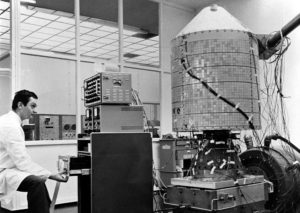
Fifty years ago: the successful launch of the Azur research satellite
 NEW DELHI: This year has already marked 50 years since the first landing on the Moon and 50 years since Airbus was founded. Now there is another 50th anniversary on the horizon: 50 years ago, Germany was elevated to the status of a spacefaring nation following the successful launch of Azur, its first research satellite.
NEW DELHI: This year has already marked 50 years since the first landing on the Moon and 50 years since Airbus was founded. Now there is another 50th anniversary on the horizon: 50 years ago, Germany was elevated to the status of a spacefaring nation following the successful launch of Azur, its first research satellite.
On 8 November 1969 at 2:52 am (CET), a Scout launch vehicle lifted off from Vandenberg, California, USA, carrying Azur into space. In doing so, Germany joined the club of nations that had placed their own satellites in orbit.
 Azur was developed and built at what are now Airbus sites in Bremen (formerly ERNO), Friedrichshafen (Dornier) and Ottobrunn (MBB). Specialist magazines at the time reported on the importance of Azur: “The construction of the Azur research satellite, in which all German space companies were involved, heralded the end of the learning phase of the 1960s.” To this day, the Azur, which weighs 72 kg, is often seen as the breakthrough in Germany’s emergence as a space research and industry nation.
Azur was developed and built at what are now Airbus sites in Bremen (formerly ERNO), Friedrichshafen (Dornier) and Ottobrunn (MBB). Specialist magazines at the time reported on the importance of Azur: “The construction of the Azur research satellite, in which all German space companies were involved, heralded the end of the learning phase of the 1960s.” To this day, the Azur, which weighs 72 kg, is often seen as the breakthrough in Germany’s emergence as a space research and industry nation.
The research satellite was used to study cosmic ray particles and how they interact with the magnetosphere, as well as to investigate the Northern Lights and solar winds. Even then, scientific interest was fierce: more than 100 experiments were proposed, of which seven ultimately made it aboard Azur. The mission ended on 29 June 1970.

